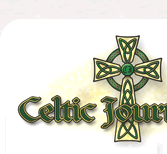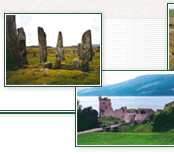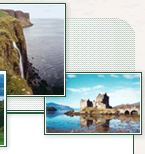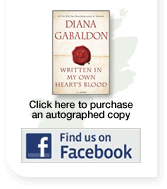Banks and Changing Currency
Scotland's currency is the British Pound Sterling. The five main Scottish banks include Bank of Scotland, Royal Bank of Scotland, Clydesdale Bank, TSB Scotland and Girobank. Banks open Monday through Friday at 9:00 a.m. or 10:00 a.m. and close at 4:00 p.m. or 5:00 p.m. Some banks open late on Thursdays and a few also open on Saturday mornings. All Scottish bank notes, though different than English notes, are normally accepted in the rest of Britain, while Northern Irish bank notes are also accepted in Scotland. Banks usually give the best exchange rate for foreign currency. It's also possible to change money in airports, larger railway stations, travel agents and some larger hotels (if you are a resident). These usually charge a fee and/or commission.
Credit Cards
Most large shops, stores, hotels and restaurants in Scotland will accept the majority of credit cards (MasterCard, Visa, American Express, Diners etc.). However, it is advisable to carry some cash in case of difficulty as many smaller accommodations, pubs, tearooms and small shops are unlikely to accept any form of credit card.
Clothing
Between May and September, it is often warm but a light waterproof coat or jacket should still be packed. From October to April, heavier sweaters are recommended, particularly is spending any amount of time outdoors. Take advantage of the local woolen mills and purchase one to take home too! If golfing, always pack golf waterproofs which allow easy movement. Note: athletic shoes, called "trainers" in the Isles, will have you standing out as the typical tourist.
Driving
A valid U.S. driver's license is accepted for driving in Scotland. Roads include a motorway network in central Scotland, with dual carriageways to key places further north such as Aberdeen and Inverness. In some areas, particularly the Highlands and Islands, there are often single-track roads, which demand extreme caution. Driving is on the left-hand side of the road, with overtaking only permissible on the right-hand side. Visitors should also remember to give way to the right on roundabouts. Speed limits are 70 mph on motorways and dual carriageways, 60 mph on single carriageways and 30 mph in built up areas, unless otherwise stated. It is also compulsory to wear seatbelts (front- and backseat) in Scotland.
Gratuities
There are no definite rules for tipping. If you feel that you have received good service then you may wish to leave a tip. This is most common in restaurants, where it is normal to leave 10% of the total bill but you should check to see if a service charge has already been included. Tipping in hotels is also at your discretion. It is not normal to tip bar staff, although they are sometimes offered a "drink", which they can take when off duty. Taxi or cab drivers are often given a tip, particularly on longer journeys, with £1.00 to £2.00 normally sufficient. Don't assume that all restaurants have added a gratuity to your bill, and if in doubt ask your server.
Medical Assistance
Visitors who become ill while in Scotland are eligible for free emergency treatment at National Health Service Accident and Emergency hospital departments. If however, you are admitted to hospital as a patient, or referred to an outpatient clinic, you will be asked to pay unless you are a citizen of a European country or a resident of a country which has a reciprocal health-care agreement with the UK.
It is strongly advised to take out adequate insurance coverage before travelling - although it is unlikely that anything will happen, it's best to be covered. You do not need an International Certificate of Vaccination for entry to the UK. Scotland does have midges (small flies) that bite, so if you intend spending time outdoors, you should pick up some insect-repellent at a drug store.
Passport and Visa Requirements
US Citizens need a passport with validity six months past the date of travel.
Telephones
Telephone numbers comprise an area code (always beginning with 01) and then the local number. A typical Scottish phone number would be (01224) 908123. Whenever dialling another UK phone number from within Scotland, you should always dial the complete number (both the area code and local phone number). The local operator can be contacted toll free by dialing 100. If calling a Scottish number from outside the United Kingdom, dial the international access code for the UK (011) followed by the code for the UK (44) and then the area code, dropping the first 0. Taking the above number as an example, the number would be:
International Code +UK Code +Area Code +Phone Number 011 44 1244 908123
Voltage and Electrical Equipment
Voltage is 240v 50Hz. Most establishments in Scotland have square-pin sockets for 3, 5 and 13 amp fuses. You can buy an adapter at your departure airport.
Tax Refunds on Goods
Non-EU visitors to Scotland can reclaim the Value Added Tax (VAT) of 17.5% on goods by using the Foreign Exchange Tax Free Shopping arrangements. This service is not available in every shop, so VAT can only be reclaimed on goods purchased from shops that display window signage for VAT refunds. A tax-free shopping form should be obtained and completed at the place of purchase (remember to take your passport with you) and presented to HM Customs and Excise as you leave the UK. If your last point in the UK is Glasgow, you would deposit the form at Glasgow but if you have a flight connection through another point in the UK, for example London or Manchester, you would deposit the form at that airport.
Ireland
Banks and Changing Currency
The Euro is the local currency of the Republic of Ireland, and the British Pound Sterling is the local currency of Northern Ireland. The two currencies are not interchangeable, however Northern Irish bank notes are also accepted in Scotland. Banks generally open Monday through Friday at 9:30 a.m. and close at 4:30 p.m. and until 5:00 p.m. on Thursday. Banks usually give the best exchange rate for foreign currency. It's also possible to change money in airports, larger railway stations, travel agents and some larger hotels (if you are a resident). These usually charge a fee and/or commission.
Credit Cards
Any credit card that bears the Visa, MasterCard or American Express logo will be widely accepted in Ireland. Other cards may be accepted, but it's wise to check locally prior to your trip.
Clothing
Ireland's weather is similar to the rest of the British Isles, and enjoys the warm currents of the Gulf Stream. The temperature seldom drops below 40F degrees. Showers can happen at any time but don't linger often. For the summer months always pack a light jacket. Other times, heavier sweaters can be packed or bought at local woolen mills. It's always a good idea to pack a raincoat and umbrella. Note: athletic shoes, called "trainers" in the Isles, will have you standing out as the typical tourist.
Driving
A valid U.S. driver's license is sufficient for driving in Ireland. Driving is on the left side of the road and seat belts must be worn at all times in the front and back of the vehicle. Motorcyclists and passengers must wear helmets; there are very strict laws on drinking and driving. In both the Replulic of Ireland and Northern Ireland, speed limits are 30 mph in built-up urban areas, 60 mph on the open road and 70 mph on the motorway.
Gratuities
In restaurants, when a service charge is not included, 10 to 15% of the bill is appropriate. Taxi drivers are usually tipped 10% of the fare and porters about one dollar (equivalent) per bag. Tipping bar staff is at your discretion. Don't assume that all restaurants have added a gratuity to your bill, and if in doubt ask your server.
Medical Assistance
Visitors from North America should have private medical insurance. Check with your carrier before leaving on your trip, and if you have no coverage for overseas you can purchase coerage from companies that provide insurance for travel purposes.
Passport and Visa Requirements
US Citizens need a passport with validity six months past the date of travel.
Telephones
Pre-paid phone cards are available in all of Ireland and are the most cost-effective way to phone home. If calling the U.S. from Ireland, you must dial 011, the area code and phone number. If calling Northern Ireland from the U.S., all phone numbers must be prefixed with +44. If calling Northern Ireland from the Republic of Ireland, replace the prefix code 028 with the code 048. If calling the Republic of Ireland from the U.S., all numbers must be prefixed with +353. For mobile phones, only digital phones with GSM subscriptions and a roaming agreement will work in Ireland. Check with your local supplier before leaving home. You can also rent a mobile phone.
Voltage and Electrical Equipment
The standard electricity supply is 220v AC in the Republic or Ireland and 240v 50Hz in Northern Ireland. You can buy an adapter at your departure airport.
Tax Refunds on Goods
Claiming a VAT (Value Added Tax) refund is simple. Remember that it is only refundable on goods, not for services. Shops that display "Tax-Free Shopping" signs in the window will have a tax refund document that you will fill out. The form is presented to a customs officer at your departure airport who will validate the form. At some airports you can receive the refund on the spot, otherwise you will mail the form back to the shop for your refund.










